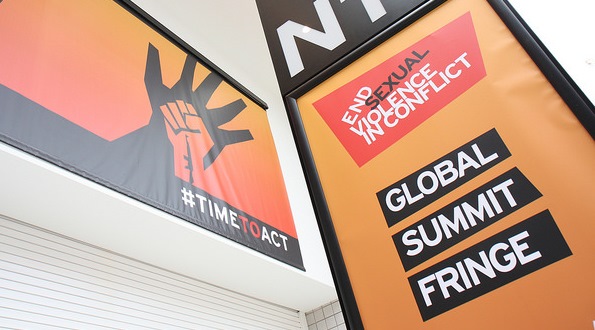BECOME A MEMBER
>JOIN
PN Member Lord McConnell is Calling for Action to Stop Sexual Violence in Conflict

On the occasion of the Global Summit to End Sexual Violence in Conflict that was held in London on June 10-13, 2014, PN member Lord McConnell is calling for more action to stop sexual violence in conflict. "We need international standards for conduct, for investigations and for evidence, and then a determination to expose, prosecute and isolate those who carry out this violence and those who protect them," he is writing on the blog of the UK House of Lords.
In October 2009, deep in the jungle in Eastern Democratic Republic of Congo, I visited a small village where 40 brave UN Peacekeepers from India were ‘protecting’ the villagers from the armed groups who were killing and looting across the region, and from their National Army who were, then, probably as guilty as the groups.
I insisted on spending some time with the women of the village. Their feeling of powerlessness in the face of the horrors they had seen and endured was stark. They had undoubtedly been raped and humiliated in front of their families, and probably by more than one side. I am still haunted by the fear and the hopelessness in their eyes.
Weeks earlier I had chatted to teenage girls in Liberia who had become mothers when their rapes resulted in pregnancy. Supported by a UK NGO, they were using small grants to rebuild their lives and secure some independence – going back to school or starting a small market stall, and caring for the health of their babies. There was hope on the surface, but asked what was the best thing about the baby one girl said ‘there are no good things about this baby’.
Millions of women have been subjected to sexual violence as a result of conflict, and millions of men and boys have been raped too.
All over the world we need to do more for the victims. We need to end the stigma. By openly telling the stories, and the scale of this sexual violence, women (and the male victims too) will find strength in numbers, and hopefully the confidence to talk about and move on from the horrific ordeals they have experienced.
From Bosnia to Liberia, from the DRC to Sri Lanka, and today in Nigeria and Syria, these girls and women need real support – counselling, health services and of course independent finance to build a future. The future of these women will be critical to the life chances of their children, and to the development of their communities. Those women in DRC had no-one to turn to, so we need to speak out for them. Those girls in Liberia had some help, but they were rare examples of lives in recovery. That is why globally we must stand together to demand change and deliver programmes of support.
But to really STOP sexual violence in conflict, we need more than words, and more than resources. We need action against the perpetrators, action on the armies – official and unofficial – who organize and plan these attacks, and action to isolate the governments who cover it up.
It IS possible to significantly reduce the use of rape and horrific sexual violence in conflict. Those who plan and execute these attacks fear punishment for their crimes; the army and armed group leaders who allow it, or worse still plan it, do not want to end up in an international court or a national jail; and the politicians who cover it up will think twice if the international repercussions are more significant for cover up than for transparency.
We need international standards for conduct, for investigations and for evidence, and then a determination to expose, prosecute and isolate those who carry out this violence and those who protect them.
Twenty years ago, the reports of systematic rapes by Serbian forces to ethnically cleanse Bosnia horrified and sickened me. They transformed my lifelong interest in campaigning for global justice into a more focused determination to campaign on conflict, sexual violence, and peacebuilding. I was horrified that our UK government was not willing to do more to stop the sickening crimes taking place
But I am very proud of the UK today: leading the global effort to end sexual violence in conflict. This international initiative, with the Global Summit to End Sexual Violence in Conflict in London and action in Embassies all over the world, has already made a difference, raising awareness and creating momentum. But with the right decisions this week we can make a real step forward. I sincerely hope the aims of the Summit are met, and a protocol is agreed.
It is time to act – and for future generations of women and girls, there must be no delay.
Originally published at Lords of the Blog - Life and Work in the House of Lords.
Photo courtesy of the Foreign and Commonwealth Office.
PN Member Lord McConnell, former First Minister of Scotland, is chair of the All-Party Parliamentary Group on the Great Lakes Region of Africa in the UK Parliament. He was Member of the Scottish Parliament for Motherwell and Wishaw from 1999 to 2011 and served as the Prime Minister Gordon Brown’s Special Representative for Peacebuilding from 2008 to 2010.

